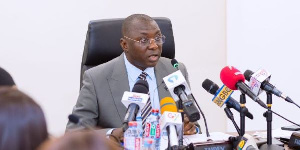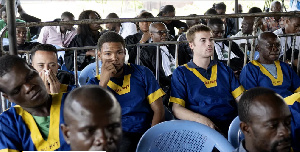- Home - News
- Polls
- Year In Review
- News Archive
- Crime & Punishment
- Politics
- Regional
- Editorial
- Health
- Ghanaians Abroad
- Tabloid
- Africa
- Religion
- Election 2020
- Coronavirus
- Photo Archives
- News Headlines
- Press Release
Press Releases of Sunday, 20 February 2022
Source: Sampson Manu, Contributor
J.B. Danquah Memorial lectures 2022
The Ultra-modern auditorium of the Ghana Academy of Arts And Sciences at Airport Residential Area, near Opeibea,GA-015-1825; Accra is set to explode with knowledge between Monday, 21 and Wednesday, 23 February, 2022 as one of Ghana’s most celebrated young and international legal luminary, Professor Richard Frimpong Oppong shares his ideas on the title:
THE DIGITAL WORLD AND THE FUTURE OF THE GHANAIANLEGAL SYSTEM: REFLECTIONS AHEAD OF ITS SESQUICENTENNIAL-at this year’s J. B. Danquah Memorial Lectures.
Synopsis
As a people, we have become accustomed to the ever increasing benefits of our technologically mediated lives. We live in a digital world. Engagement with digital devices, social media platforms, and online commercial transactions have become commonplace for many of us.
The overall theme of the three lectures is that, like individuals, legal systems are not immune to the impact of information technology and the digital world it has created. Accordingly, as the Ghanaian legal system approaches its sesquicentennial,(150 years anniversary) it should embrace information technology to advance its functions and goals.
Lecture 1
Explores how information technology challenges the Ghanaian legal system’s regulatory functions. It argues that, to date, while the state has enacted various legislation and policies to address some of the existing societal challenges, there remain significant gaps that the Ghanaian legal system must address. The lecture focusses on consumer protection in the digital market place and new ways of working organised labour through digital platforms-two areas characterized by asymmetric legal relationships.
Lecture 2
Examines the access to justice deficit in Ghana. It argues for a broader conception of access to justice, explores leveraging digital technologies to create new pathways to justice in Ghana, and examines the risk of digital exclusion and threat to judicial independence inherent in such technologies.
Lecture 3
Examines legal practice and education. It argues that information technology can transform legal practice and education in a manner not witnessed since the inception of the Ghanaian legal system. The lecture will examine ways in which legal practice and education can adapt to the digital world.
Profile of Prof Oppong
Before assuming his present position as Professor of Law at California Western School of Law, San Diego, USA; Prof. Oppong graduated from the University of Ghana with First Class Honours in Bachelor of Laws in 2001 when he won the John Mensah Sarbah price as the best law student before pursuing his professional law course at the Ghana School of Law and was called to the bar in 2003.
He thereafter attended University of Cambridge in the UK for his first Master of Laws (LL.M.) in 2004 and for his second Master of Laws at the University of Harvard in the United States in 2005. He obtained his doctorate (Ph.D.) in law at the University of British Columbia, Vancouver, Canada in 2010.
He has been an indefinite lecturer in Law at the Lancaster University Law School and Killam Postdoctoral Research Fellow, Schullich School of Law, Dalhousie University, Halifax, Canada between 2007 and 2011. He has held an Associate Professor and lecturer at the faculty of Law at the Thompson Rivers University in British Columbia in Canada.
He was elected an Associate Member of the International Academy of Comparative Law in 2013; elected a Fellow of the Ghana Academy of Arts and Sciences in April 2016 (the youngest law academician ever so elected in Ghana) and selected as a Member of the Royal Society of Canada’s cohort (RSC) 2017 of the College of New Scholars, Artists and Scientists in June 2017-arguably the first African so elected.
Professor Oppong has taught at and worked for academic institutions in Canada, Ghana, Saudi Arabia, South Africa, Tanzania, the Netherlands, the United Kingdom and now the United States. He has successfully supervised more than 40 Master of Laws dissertations and one Doctoral thesis.
In 2012, he held the post of Director of Studies (Private International Law) at The Hague Academy of International Law. He was a member of the Working Group of The Hague Conference on Private International Law that developed The Hague Principles on Choice of Law in International Commercial Contracts 2015.
In 2017, he was appointed Programme Advisor to the Tanzanian-German Centre for Eastern African Legal Studies (TGCL), in recognition of his internationally renowned expertise on regional economic integration in Africa.
He has advised Ghanaian and foreign law firms on many international transactions.
He has published four books, two co-edited books, and over 45 articles, book chapters and book reviews. His writings have been variously described by independent reviewers as “tackling a major problem of long-term interest”, “offering innovative insights”, “a remarkable tour de force”, “ambitious and methodologically executed”, “clear and authoritative”, “instructive, illuminating, lucid, thoroughly researched”, “clear, accessible, informed and informative”, and as of “practical value” and of “exceptional quality”.
It, therefore, comes as no surprise that the British Academy, the Social Sciences and Humanities Research Council of Canada, the Killam Trusts and Foundation for Legal Research in Canada funded some of his research.
Two of his publications have won international awards, namely the “2013 American Society of International Law prize in Private International Law” and the “2014 James Crawford Prize of the Journal of International Dispute Settlement.”
In 2011, he was nominated for the prestigious Hessel Yntema Prize of the American Journal of Comparative Law. Some of his publications have been translated into French and Chinese.
He is frequently cited in academic publications and has been cited in judicial decisions. Professor Oppong is a member of the Advisory Board of the highly regarded Yearbook of Private International Law, and an Assistant Editor to the Global Journal of Comparative Law. He serves on the editorial board of the State Practice and International Law Journal, and the Journal of International Trade Law and Policy. He has peer-reviewed articles, books and funding applications for more than twenty different journals, publishers and funding agencies.











